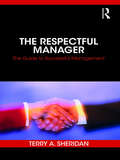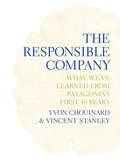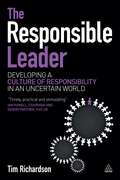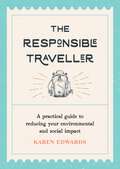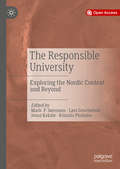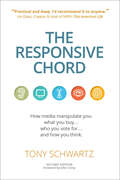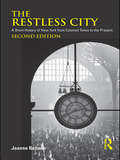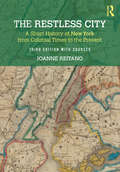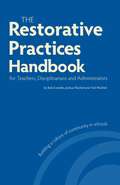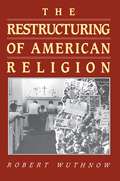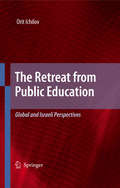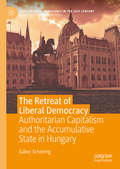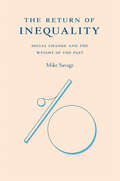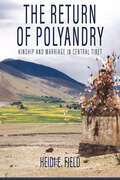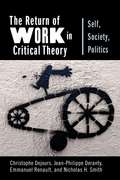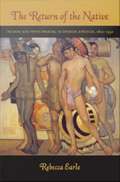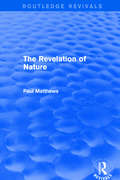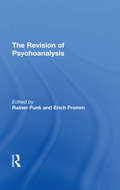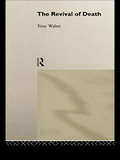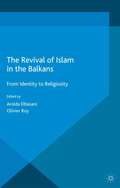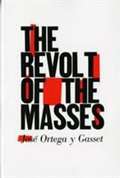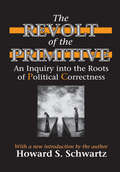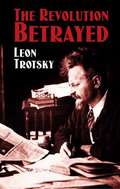- Table View
- List View
The Respectful Manager: The Guide to Successful Management
by Terry A. SheridanMany people are confused by mixed messages from their managers. About 85% of the pool of managers are malevolent, who do not care about the organisation and use the structure for their own needs of power and control. We know what a good manager looks like, but in complex social interactions within organisations this can be confused with the manipulations of the malevolent managers, from CEO to the lowest grade supervisor. The Respectful Manager: The Guide to Successful Management is about the application of the Executive Impression Management type of the Respectful Manager, derived from new ground-breaking research regarding fraudster managers. It explains clearly and precisely what a good manager looks like and behaves like with their co-workers. In this book, the foundations are laid to understand and recognise a Respectful Manager. This is critical for management training purposes and for managerial recruitment and promotion procedures. For those looking at increasing profitability, increasing competitive edge, and engaging their workforce in fulfilling work, the Respectful Manager is the key. This book is a must read for those who aspire to management roles, including senior management, as a guide to the very best practice in the field.
The Responsible Company
by Yvon Chouinard Vincent StanleyThe Responsible Company, by Yvon Chouinard, founder and owner of Patagonia, and Vincent Stanley, co-editor of its Footprint Chronicles, draw on the their 40 years' experience at Patagonia - and knowledge of current efforts by other companies - to articulate the elements of responsible business for our time.Patagonia, named by Fortune in 2007 as the coolest company on the planet, has earned a reputation as much for its ground-breaking environmental and social practices as for the quality of its clothes. In this exceptionally frank account, Chouinard and Stanley recount how the company and its culture gained the confidence, by step and misstep, to make its work progressively more responsible, and to ultimately share its discoveries with companies as large as Wal-Mart or as small as the corner bakery.In plain, compelling prose, the authors describe the current impact of manufacturing and commerce on the planet's natural systems and human communities, and how that impact now forces business to change its ways. The Responsible Company shows companies how to reduce the harm they cause, improve the quality of their business, and provide the kind of meaningful work everyone seeks. It concludes with specific, practical steps every business can undertake, as well as advice on what to do, in what order.This is the first book to show companies how to thread their way through economic sea change and slow the drift toward ecological bankruptcy. Its advice is simple but powerful: reduce your environmental footprint (and its skyrocketing cost), make legitimate products that last, reclaim deep knowledge of your business and its supply chain to make the most of opportunities in the years to come, and earn the trust you'll need by treating your workers, customers and communities with respect.
The Responsible Leader
by Tim RichardsonResponsibility as a leader is the ability to respond quickly to a complex and changing business environment. It means using values to make decisions that not only affect brand trust and corporate reputation, but impact upon employees and the wider community. In today's increasingly interconnected world, it is more important than ever that managers can achieve goals and desired results while still maintaining a degree of authenticity, ethics and stewardship. The Responsible Leader identifies what it means to be an authentic leader, taking in intra-organizational relationships, role modelling and ethical practice.Addressing the practical challenge of implementing a framework of corporate social responsibility in an organization that may embrace thousands of people, The Responsible Leader sets out what this strategy looks like in practice and advises on creating a new and hopeful narrative for the future. Drawing on in-depth case studies from HSBC, PwC, Oasis and Marks and Spencers that chart the journey to responsible and sustainable management in challenging environments, it presents a fresh vision for leadership success that goes beyond simple compliance.
The Responsible Traveller: A Practical Guide to Reducing Your Environmental and Social Impact, Embracing Sustainable Tourism and Travelling the World With a Conscience
by Karen EdwardsThe Responsible Traveller is your ticket to sustainable and ethical travel. This pocket-sized book provides the knowledge and tools that can help you to explore the world with a lighter footprint.Whether you travel out of curiosity, to find respite, to remind yourself of how vast and wonderful our planet is, or in search of life-shaping adventures, having the freedom to explore can be exhilarating and hugely rewarding. However we owe it to the people, cultures, ecosystems and wildlife that we encounter along the way to travel with respect; to preserve our beautiful world for generations to come.The Responsible Traveller will show you how to make actionable changes that result in more thoughtful and adventurous travels, while also doing our very best for Planet Earth. Through case studies and storytelling, you’ll learn about the environmental and social effects of tourism and gain a deeper understanding of cultural sensitivity. And through simple, achievable tips and practical lifestyle changes, you’ll discover how you can make an almighty difference in reducing your impact. Empowered with this information, perhaps your next adventure will be inspired by consideration, understanding and compassion.
The Responsible Traveller: A Practical Guide to Reducing Your Environmental and Social Impact, Embracing Sustainable Tourism and Travelling the World With a Conscience
by Karen EdwardsThe Responsible Traveller is your ticket to sustainable and ethical travel. This pocket-sized book provides the knowledge and tools that can help you to explore the world with a lighter footprint.Whether you travel out of curiosity, to find respite, to remind yourself of how vast and wonderful our planet is, or in search of life-shaping adventures, having the freedom to explore can be exhilarating and hugely rewarding. However we owe it to the people, cultures, ecosystems and wildlife that we encounter along the way to travel with respect; to preserve our beautiful world for generations to come.The Responsible Traveller will show you how to make actionable changes that result in more thoughtful and adventurous travels, while also doing our very best for Planet Earth. Through case studies and storytelling, you’ll learn about the environmental and social effects of tourism and gain a deeper understanding of cultural sensitivity. And through simple, achievable tips and practical lifestyle changes, you’ll discover how you can make an almighty difference in reducing your impact. Empowered with this information, perhaps your next adventure will be inspired by consideration, understanding and compassion.
The Responsible University: Exploring the Nordic Context and Beyond
by Rómulo Pinheiro Lars Geschwind Mads P. Sørensen Jouni KekäleThis book explores how the notion of the responsible university manifests itself at various levels within Nordic higher education. As the impetus of the knowledge society has catapulted the higher education sector to the forefront of policy agendas, universities and other types of higher education institutions face increasing scrutiny, assessment and accountability. This book examines this phenomenon using the Nordic countries as cases in point, given the strong public commitment towards widening participation and public research investments. The editors and contributors analyse the history and current transformations of the idea of the responsible university, investigate new innovations in the educational landscape and look into how universities have begun to organise themselves to become more responsible. Drawing together scholars from the humanities and the social sciences, this interdisciplinary collection will be of interest and value to students and scholars of the role and nature of the modern university, in addition to practitioners and policy makers tasked with finding solutions to address the competing and often contradictory demands posed by a responsibility agenda.
The Responsive Chord: How Media Manipulate You: What You Buy . . . Who You Vote For . . . and How You Think.
by Tony SchwartzThe classic work on how media affects us by the man who helped create the most famous political ad in television history.Tony Schwartz drew on his unparalleled experience in the communications industry to give us The Responsive Chord, an engaging read and one of the seminal books on media. Famed for his “Daisy” campaign ad and a pioneering anti-tobacco PSA, Schwartz came to understand that most advertisers, politicians, and educators?in fact, almost all of us?use a model of communication long outmoded by the coming of electronic media: a model which has made us blind to many of the inner workings of modern communication.In The Responsive Chord, he puts forth the resonance principle—that the meaning of an ad (or any other piece of communication) is not present in the ad itself but rather in how the ad relates to the vast array of knowledge and associations already held in the mind of the viewer, both factual and emotional. Thus, audience members do not merely digest a message; they are an essential force in creating it. Schwartz guides us through the many fascinating consequences. The implications for anyone looking to impart a message or influence decisions are enormous.With so many people now getting their information through social media and “fake news” sites, it is crucial that we understand the strong forces by which these outlets act upon us and, yes, manipulate our ideas and actions. The Responsive Chord reveals these forces in a compelling, revealing read.“I read The Responsive Chord as a freshman in college and it affected everything I've ever made since. Its message is practical and deep. I'd recommend it to anyone.”?Ira Glass, creator and host of NPR's This American Life“Maybe reading this book will prepare us to think more critically about the way social media is used on, and against, us today.”?Douglas Rushkoff, author, Program or Be Programmed
The Restless City: A Short History of New York from Colonial Times to the Present
by Joanne ReitanoThe Restless City: A Short History of New York from Colonial Times to the Present is a short, lively history of the world’s most exciting and diverse metropolis. It shows how New York’s perpetual struggles for power, wealth, and status exemplify the vigor, creativity, resilience, and influence of the nation’s premier urban center. The updated second edition includes nineteen images and brings the story right up through the mayoral election of 2009. In these pages are the stories of a broad cross-section of people and events that shaped the city, including mayors and moguls, women and workers, and policemen and poets. Joanne Reitano shows how New York has invigorated the American dream by confronting the fundamental economic, political, and social challenges that face every city. Energized by change, enriched by immigrants, and enlivened by provocative leaders, New York City’s restlessness has always been its greatest asset.
The Restless City: A Short History of New York from Colonial Times to the Present
by Joanne ReitanoThe Restless City: A Short History of New York from Colonial Times to the Present is a brief, insightful and lively history of the peoples, events and interactions that have formed New York City. Weaving together the shifting currents of economic, political, social, and cultural life, Joanne Reitano shows how New York has acted both as an indicator and a driver of the American experience in its negotiation of evolving urban challenges. The third edition of The Restless City has been updated to include new material on early settler/Native American interactions, and to be more fully inclusive of the outer boroughs of New York. Each chapter features at least two primary sources accompanied by discussion questions for students. Authoritative and comprehensive, The Restless City remains a superior resource for students and scholars interested in the rich history of the nation’s premier urban center.
The Restorative Practices Handbook for Teachers, Disciplinarians and Administrators
by Bob Costello Joshua Wachtel Ted WachtelThis is a practical guide for teachers who want to instill restorative practices in their students.
The Restructuring of American Religion: Society and Faith since World War II (Studies in Church and State #2)
by Robert WuthnowThe description for this book, The Restructuring of American Religion: Society and Faith since World War II, will be forthcoming.
The Retreat from Public Education
by Orit IchilovThe purpose of this book is to provide a comprehensive analysis of the universal elements which characterize markets in education without focusing on any particular country. This includes the examination of the social conditions that facilitate the invasion of all public spaces by the free market, analysis of the various education policies and practices that embody privatization of education, and most importantly, exploring the educational and social consequences of markets in education. Secondly, the book examines the process of the building of the public education system in Israel, and analyze the retreat from it in recent years. The Israeli public (or state) education system emerged shortly after the establishment of the state in 1948. This case study provides a unique opportunity to closely examine the significance of public schooling in the process of nation-building, and in the building of a democracy. This represents a pioneering attempt to study the rise and fall of state education in Israel.
The Retreat of Liberal Democracy: Authoritarian Capitalism and the Accumulative State in Hungary (Challenges to Democracy in the 21st Century)
by Gábor ScheiringThis book is the product of three years of empirical research, four years in politics, and a lifetime in a country experiencing three different regimes. Transcending disciplinary boundaries, it provides a fresh answer to a simple yet profound question: why has liberal democracy retreated? Scheiring argues that Hungary’s new hybrid authoritarian regime emerged as a political response to the tensions of globalisation. He demonstrates how Viktor Orbán’s Fidesz exploited the rising nationalism among the working-class casualties of deindustrialisation and the national bourgeoisie to consolidate illiberal hegemony. As the world faces a new wave of autocratisation, Hungary’s lessons become relevant across the globe, and this book represents a significant contribution to understanding challenges to democracy. This work will be useful to students and researchers across political sociology, political science, economics and social anthropology, as well democracy advocates.
The Return of Inequality: Social Change and the Weight of the Past
by Mike SavageA pioneering book that takes us beyond economic debate to show how inequality is returning us to a past dominated by empires, dynastic elites, and ethnic divisions. The economic facts of inequality are clear. The rich have been pulling away from the rest of us for years, and the super-rich have been pulling away from the rich. More and more assets are concentrated in fewer and fewer hands. Mainstream economists say we need not worry; what matters is growth, not distribution. In The Return of Inequality, acclaimed sociologist Mike Savage pushes back, explaining inequality’s profound deleterious effects on the shape of societies. Savage shows how economic inequality aggravates cultural, social, and political conflicts, challenging the coherence of liberal democratic nation-states. Put simply, severe inequality returns us to the past. By fracturing social bonds and harnessing the democratic process to the strategies of a resurgent aristocracy of the wealthy, inequality revives political conditions we thought we had moved beyond: empires and dynastic elites, explosive ethnic division, and metropolitan dominance that consigns all but a few cities to irrelevance. Inequality, in short, threatens to return us to the very history we have been trying to escape since the Age of Revolution. Westerners have been slow to appreciate that inequality undermines the very foundations of liberal democracy: faith in progress and trust in the political community’s concern for all its members. Savage guides us through the ideas of leading theorists of inequality, including Marx, Bourdieu, and Piketty, revealing how inequality reimposes the burdens of the past. At once analytically rigorous and passionately argued, The Return of Inequality is a vital addition to one of our most important public debates.
The Return of Polyandry: Kinship and Marriage in Central Tibet
by Heidi E. FjeldTibet is known for its broad range of marriage practices, particularly polyandry, where two or more brothers share one wife. With economic development and massive Chinese social and political reforms, including new marriage laws prohibiting plural marriages, polyandry was expected to disappear from Tibetan social lives. This book takes as its starting point the surprising increase in polyandry in Panam valley from the 1980s. It explores married lives in polyandrous houses and develops a theory of a flexible kinship of potentiality through the lens of a farming village in Tibet Autonomous Region.
The Return of Work in Critical Theory: Self, Society, Politics (New Directions in Critical Theory #56)
by Nicholas H. Smith Jean-Philippe Deranty Christophe Dejours Emmanuel RenaultFrom John Maynard Keynes’s prediction of a fifteen-hour workweek to present-day speculation about automation, we have not stopped forecasting the end of work. Critical theory and political philosophy have turned their attention away from the workplace to focus on other realms of domination and emancipation. But far from coming to an end, work continues to occupy a central place in our lives. This is not only because of the amount of time people spend on the job. Many of our deepest hopes and fears are bound up in our labor—what jobs we perform, how we relate to others, how we might flourish.The Return of Work in Critical Theory presents a bold new account of the human significance of work and the human costs of contemporary forms of work organization. A collaboration among experts in philosophy, social theory, and clinical psychology, it brings together empirical research with incisive analysis of the political stakes of contemporary work. The Return of Work in Critical Theory begins by looking in detail at the ways in which work today fails to meet our expectations. It then sketches a phenomenological description of work and examines the normative premises that underlie the experience of work. Finally, it puts forward a novel conception of work that can renew critical theory’s engagement with work and point toward possibilities for transformation. Inspired by Max Horkheimer’s vision of critical theory as empirically informed reflection on the sources of social suffering with emancipatory intent, The Return of Work in Critical Theory is a lucid diagnosis of the malaise and pathologies of contemporary work that proposes powerful remedies.
The Return of the Native: Indians and Myth-Making in Spanish America, 1810-1930
by Rebecca EarleWhy does Argentina's national anthem describe its citizens as sons of the Inca? Why did patriots in nineteenth-century Chile name a battleship after the Aztec emperor Montezuma? Answers to both questions lie in the tangled knot of ideas that constituted the creole imagination in nineteenth-century Spanish America. Rebecca Earle examines the place of preconquest peoples such as the Aztecs and the Incas within the sense of identity--both personal and national--expressed by Spanish American elites in the first century after independence, a time of intense focus on nation-building. Starting with the anti-Spanish wars of independence in the early nineteenth century, Earle charts the changing importance elite nationalists ascribed to the pre-Columbian past through an analysis of a wide range of sources, including historical writings, poems and novels, postage stamps, constitutions, and public sculpture. This eclectic archive illuminates the nationalist vision of creole elites throughout Spanish America, who in different ways sought to construct meaningful national myths and histories. Traces of these efforts are scattered across nineteenth-century culture; Earle maps the significance of those traces. She also underlines the similarities in the development of nineteenth-century elite nationalism across Spanish America. By offering a comparative study focused on Mexico, Guatemala, Colombia, Peru, Chile, and Ecuador, The Return of the Native illustrates both the common features of elite nation-building and some of the significant variations. The book ends with a consideration of the pro-indigenous indigenista movements that developed in various parts of Spanish America in the early twentieth century.
The Revelation of Nature
by Paul MatthewsThis title was first published in 2001. "The Revelation of Nature" embraces pragmatism, aesthetics and metaphysics in an effort to narrate a fundamental relationship between the contemporary world and the natural source and site for any world of meaning. Beginning with an exploration of Heidegger's seminal insight into the way we exist - that human existence must be understood in its everydayness - Matthews links these ideas to Heidegger's interpretation of the development of Western history in terms of its grounding metaphysical determinations to do with truth, reality and the nature of things. Matthews concludes that our everyday lives are informed and shaped by intellectual precepts and normative modes of behaviour that promote the combination and enslavement of both nature and ourselves within a mass technological grid. This book breaks new ground in theology, without underpinning the analysis with a particular religious viewpoint.
The Reverend Billy Project: From Rehearsal Hall to Super Mall with the Church of Life After Shopping
by Bill Talen Savitri DReverend Billy, the revivalist preacher created by performance artist Bill Talen, has attracted an international following as he has railed in white suit and clerical collar against the evils of excessive consumerism and corporate irresponsibility. In his early solo performances in Times Square he delivered sermons by megaphone against Starbucks and the Disney Store; as his message and popularity spread, he's been joined by a 35-member choir (the Life After Shopping Gospel Choir) and a 7-piece band. The group's acclaimed stage show and media appearances (including a major motion picture,What Would Jesus Buy?) have reached millions. The Reverend Billy Project presents backstage accounts of recent performance actions by Reverend Billy and the troupe's director, Savitri D, recounting their exploits on three continents in vivid narratives that are engaging, shrewdly analytical, and at times side-splittingly funny. We watch as the group plans invisible theater interventions in Starbucks, designs a mermaid hunger strike to thwart gentrification plans for Coney Island, and makes an extended effort to preserve the public nature of New York's Union Square. We follow them to an action camp in Iceland and a flop of a show redeemed by a successful impromptu demonstration in a Berlin shopping mall. As thoughtful as they are funny and inventive, Reverend Billy and Savitri D's story-essays bring to life a playful yet sincere new form of political theater. "The Reverend Billy Project lucidly and perceptively explains the Reverend Billy phenomenon with wry, infectious humor and remarkable intelligence. Though many political activists have used theater and performance to achieve political ends, very few have left such articulate reports on what they did, let alone detailed road maps of the treacherous theatrical, political, and psychological territory they negotiated." ---Jonathan Kalb, Hunter College.
The Revision Of Psychoanalysis
by Erich Fromm Rainer FunkIn 1965 Erich Fromm became professor emeritus of psychoanalysis at the National Autonomous University of Mexico City. In the same year he finished his field research on the social character of the Mexican peasant village Chiconcuac. Released from his obligations at the university and free for a new project, he applied to various funding organizations for money to undertake a "Systematic Work on Humanistic Psychoanalysis," which he had decided to write in the course of the next few years. It was conceived as a work of three to four volumes that would deal with the complete range of psychoanalytic theory and practice. He intended nothing less than a dialectic revision.
The Revival of Death
by Tony WalterTalking about death is now fashionable, but how should we talk? Who should we listen to - priests, doctors, cousellors, or ourselves? Has psychology replaced religion in telling us how to die? This provocative book takes a sociological look at the revival of interest in death, focusing on the hospice movement and bereavement counselling. It will be required reading for anyone interested in the sociology of death and caring for the dying, the dead or bereaved.
The Revival of Islam in the Balkans: From Identity to Religiosity (Islam and Nationalism)
by Olivier Roy Arolda ElbasaniThis book shifts analytical focus from macro-politicization and securitization of Islam to Muslims' choices, practices and public expressions of faith. An empirically rich analysis, the book provides rich cross-country evidence on the emergence of autonomous faith communities as well as the evolution of Islam in the broader European context.
The Revolt of the Masses
by José Ortega Y GassetThe phenomenon of mass culture that more than any other factor stamps the character of modern life.Continuously in print since 1932, Ortega's analysis of Western culture as sinking to its lowest common denomenator and drifting toward chaos brought its author international fame and has remained one of the most influential books of our time.
The Revolt of the Primitive: An Inquiry into the Roots of Political Correctness
by Howard SchwartzThe Revolt of the Primitive explores the psychological dynamics of political correctness and gender warfare. Author Howard Schwartz argues that perceptions of men as abusers, sexual predators, and deadbeat dads have become firmly entrenched in our culture due to fantasy rather than solid, objective facts. This volume delves into the psychological forces that have given rise to these ideas and reveals the hard facts about men and women in our society.Schwartz illustrates how feminists have taken the most vulgar stereotype of men and pronounced it a universal and inviolable cultural norm. He then examines his thesis in the context of work and the work organization, discussing how the feminization of the workplace has been driven by the archetypal need to remake it into a maternal world, banishing the limitations that shape survival and progress. He examines the traditional sexual division of labor and its alleged oppressive nature. He also discusses the psychological forces that drive the idea of placing women in combat roles in the military.Howard S. Schwartz is a professor of organizational behavior in the School of Business Administration at Oakland University in Rochester, Michigan, and is one of the founders of the International Society for Psychoanalytic Study of Organizations (ISPSO).
The Revolution Betrayed
by Leon Trotsky Max EastmanWritten in 1936 and published the following year, this brilliant and profound evaluation of Stalinism from the Marxist standpoint prophesied the collapse of the Soviet Union. Trotsky employs facts, figures, and statistics to show how Stalinist policies rejected the enormous productive potential of the nationalized planned economy engendered by the October Revolution.
